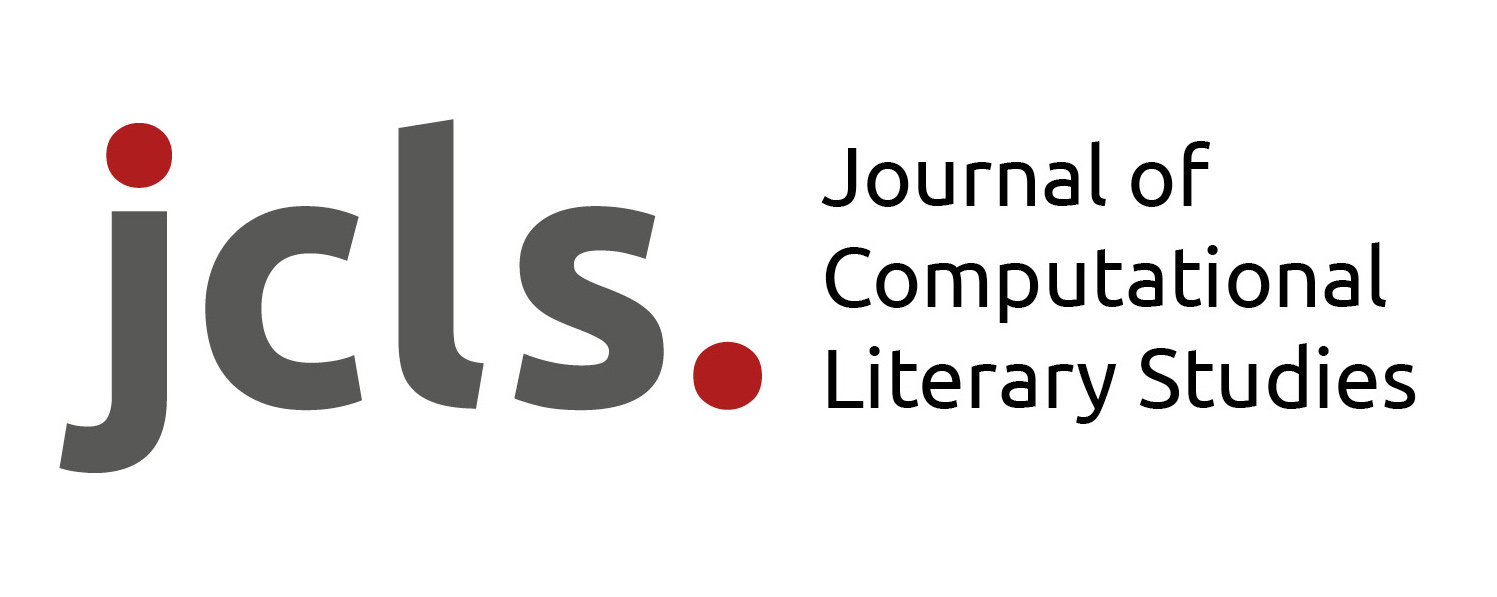Call for Papers
JCLS is an international, diamond open access, peer-reviewed online journal dedicated to all aspects of computational approaches to Literary Studies. JCLS responds to the differentiation of subfields within the Digital Humanities, an ongoing process in which Computational Literary Studies has already gained considerable maturity and visibility. The journal provides a publishing platform for works on the development, application, and critique of computational approaches to Literary Studies. (For more information about the journal, see our Mission Statement.)
When submitting an article to JCLS, authors can decide whether they want to publish an article solely in the journal (journal-only track) or whether they would like to present the article additionally at the Annual Conference of Computational Literary Studies (CCLS) (conference+journal track). We kindly encourage authors to present their articles at the conference and take advantage of this opportunity to receive feedback on their work, to participate in the discussions of related work, and to engage with the CLS community during the conference.
The Journal of Computational Literary Studies (JCLS) is open for submissions for the journal-only track at any time.
Submissions for the conference+journal track include participation in the Annual Conference of Computational Literary Studies (CCLS) in early summer. The CCLS2025 will take place on July 3-4, 2025 in Krakow. The submission deadline is February 7January 30, 2025. For more information on the conference+journal track timeline for CCLS2025 see important dates.
Scope and Topics
JCLS explicitly takes into account the diversity of literary traditions across the world's cultures and languages and encourages scholars of all languages and literatures to submit articles about computational methods for the analysis of literary texts and their contexts, be they cultural, social, historical, or performative, for instance.
Possible topics of contributions include but are not limited to:
-
Modeling in and for Computational Literary Studies,
-
Building literary corpora,
-
Annotation of texts,
-
Identifying peculiarities of literary texts,
-
Identifying common patterns and/or groupings of literary texts,
-
Operationalization of concepts,
-
Developing new methods for the analysis of literary texts,
-
Domain adaptation of methods,
-
Evaluation of algorithms and computational techniques,
-
Interpretability and transparency of results, and
-
Reproducibility of research.
JCLS also encourages submissions addressing the debatability of the core concepts of Computational Literary Studies, computationality and literarity from historical, cultural and other perspectives.
Submission Format
Submitted articles should be in English and use the JCLS LaTeX template. They should be 6000-8000 words in length (notes, code examples, figure captions included, but list of references excluded) and be unpublished work.
JCLS is committed to the openness and long-term availability of data and code (see information on Data & Code Availability).
Submission Details
Please submit articles via the journal management system. Please note that submissions to the conference+journal track are open only during specific periods (see important dates).
For detailed information about the submission see the Submission Guidelines.
Publication Fees
JCLS does not require authors to pay an article processing charge (APC) or any other fee in order to publish an article. Also, readers do not have to pay any fees. This is possible because JCLS is published using infrastructure maintained by the Open Library of Humanities and made available to our journal through the University and State Library Darmstadt (ULB) and because we can rely on a distributed editorial team.
Conference
Submissions for the conference+journal track include participation in the Annual Conference of Computational Literary Studies in early summer. For an overview of upcoming and past conferences see https://jcls.io/site/conference/.
Editorial Team
Editors: Evelyn Gius, Christof Schöch, Peer Trilcke
Editorial Assistants: Svenja Guhr, Julian Häußler, Élodie Ripoll, Henny Sluyter-Gäthje
Production Developer: t.b.a.
Board: Katherine Bode, Anne-Sophie Bories, Amy E. Earhart, Maciej Eder, Miguel Escobar Varela, Martin Eve, Frank Fischer, José Eduardo González, Natalie M. Houston, Fotis Jannidis, Mike Kestemont, Erik Ketzan, Anouk Lang, David Mimno, Borja Navarro, Roxana Patras, Federico Pianzola, Glenn Roe, Richard Jean So, Tomoji Tabata, Ted Underwood, Karina van Dalen-Oskam, Paul Vierthaler
For inquiries contact the Editorial Team at info@jcls.io
